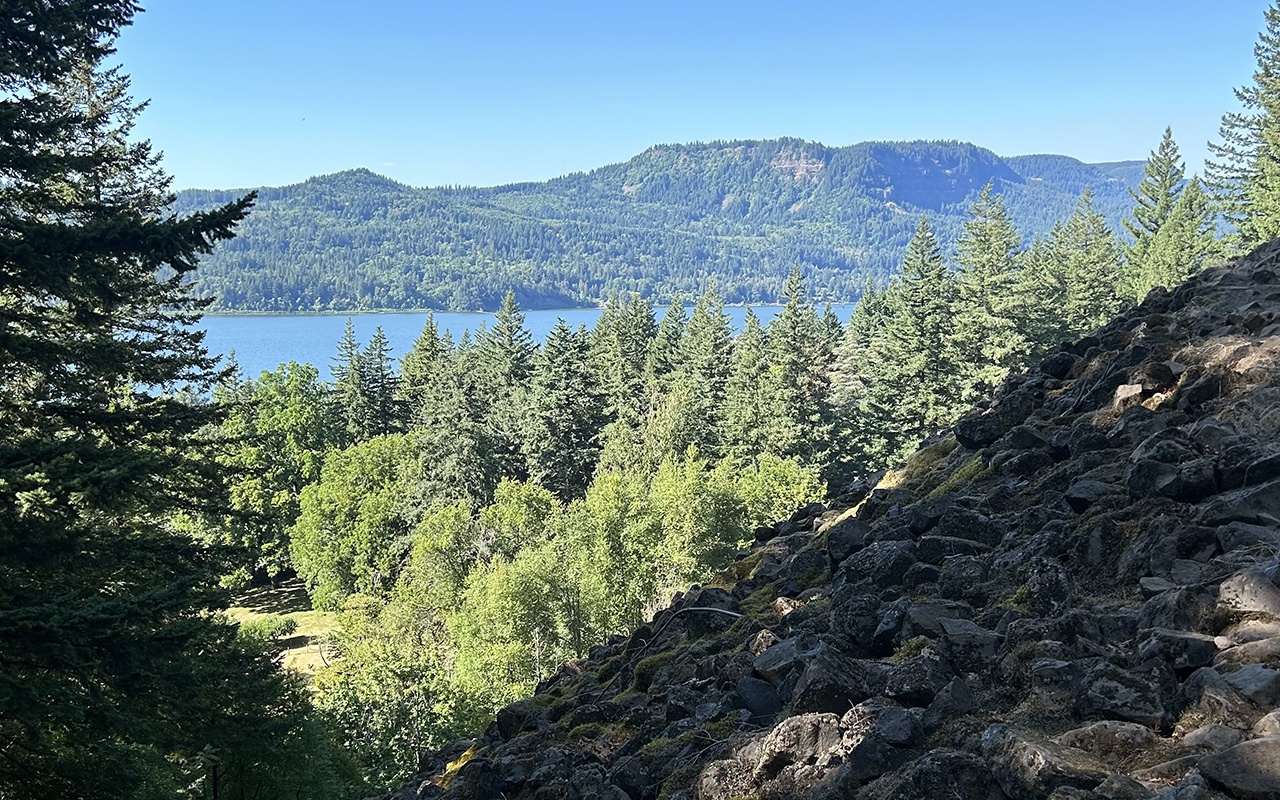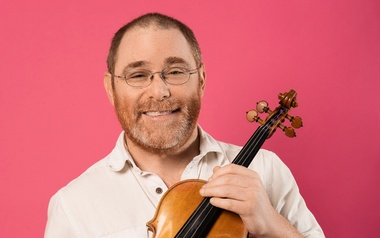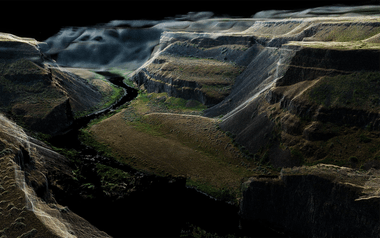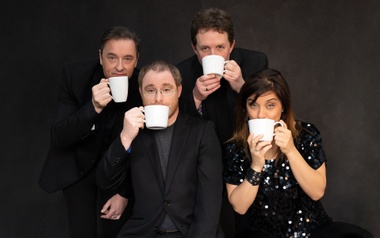Blog
MARCH 29, 2024
Lisa Interviews Geologist Dr. Scott Burns

Executive Director Lisa Lipton met with Dr. Scott Burns, Professor Emeritus at Portland State University, in his office to ask a few simple questions about the Missoula Flood Path, and where to start in understanding the natural history of this area of the Pacific Northwest.
Lisa: What’s a simple, quick explanation of the Missoula flood and what happened?
Scott: At the tail end of the last ice age, near that skinny part of Idaho, the continental glacier was coming from the north, the glaciers were melting, and coming towards a big ice dam, higher than the space needle. This created a large lake that went all the way to Missoula, called Glacial Lake Missoula, and it was half the size of Lake Michigan. All the water eventually flooded into Washington, Oregon, the Columbia Gorge – it came in, and while the Gorge was already there, this flood came in and deepened the area. It carved out Lake Oswego and the rest of it went to the Willamette Valley, and that is why we have such good soil – from the sediment of 40 floods from 15-18,000 years ago. There were other floods that only made it to Spokane and central Washington, so 80-plus floods in all that formed everything. It’s a very special situation that formed the lake that eventually broke the ice dam.
Lisa: How does this shape modern life for us?
Scott: It created new topography in the Willamette Valley. We have all this great soil from these floods. It eroded away huge parts of Washington and several falls were created by these sets of floods. We have sixteen thousand square miles that were affected in the Pacific Northwest. It also wiped out a lot of megafauna and Native Americans living along the rivers at this time.
Lisa: If someone were going to educate themselves on the Missoula floods, where should they start?
Scott: I’ve written a book with colleagues that gives a great history on this, called Cataclysms on the Columbia. It was written by John Eliot Allen, Marjorie Burns, and myself. John Allen was my mentor and all of us are native Oregonians. All the profits from this book go to helping geology students at Portland State with their professional pursuits within the field, and it gives an in-depth look at the geologic history of the area in an easy-to-understand way. In 2014, I gave over 148 talks on four major subjects. I toured from coast to coast to do this, and one of my four subjects was the Missoula Floods. OPB has also aired a few specials that I gave a talk for that are really great programs to check out.
Lisa: What’s the most interesting part of this history to you?
Scott: How science works and doesn’t work. In 1922 a man named J Harlen Bretz took his students to eastern Washington, and he thought it looked like a large flood came through – he called it the Spokane flood. Geologists of the day disagreed. He was going against uniformitarianism, that all landscapes are created slowly by time, not catastrophically. He stuck to it, and eventually the data came out in 1940 that the glacial lake Missoula had created this. When I give my talks, there are two major concepts: how science works and doesn’t work. He went against the thinking of the day to prove his scientific claims. I enjoy passing on the sentiment that we can always investigate things and look at them differently.
More about Dr. Scott Burns and his book:
Scott Burns is Professor Emeritus of Geology and Past-Chair of the Dept. of Geology at Portland State University, where he just completed his 34th year of teaching. He was also Associate Dean of the College of Liberal Arts and Sciences at PSU from 1997-1999. Scott has been teaching for 53 years, with past positions in Switzerland, New Zealand, Washington, Colorado, and Louisiana. Dr. Burns specializes in environmental and engineering geology, geomorphology, soils, and Quaternary geology. Scott has won many awards for outstanding teaching, the most significant being the Faculty Senate Chair Award at Louisiana Tech University in 1987, the Distinguished Faculty Award from the Portland State Alumni Association in 2001, and the George Hoffmann Award from PSU in 2007. Based on his national leadership performance, Scott was chosen to be a fellow of the Geological Society of America (2004) and a fellow with the Kellogg National Fellowship Program (1990 – 1993). In 2009 he was president of the Downtown Rotary Club of Portland, Oregon’s oldest and largest Rotary club. Scott is a 6th generation Oregonian who grew up in Beaverton and is very happy to be “home” after a 25 year hiatus! He actively helps local TV, radio stations and newspapers bring important geological news to the public. Scott enjoys all sports, especially basketball, running, skiing, hiking, swimming, tennis, and golf.
Cataclysms on the Columbia
The Great Missoula Floods
Revised Second Edition
By John Eliot Allen, Marjorie Burns, and Scott Burns
Cataclysms on the Columbia tells two stories. One follows geological research that challenged the scientific paradigm of the early 20th century, and the other chronicles the result of that research: the discovery of powerful prehistoric floods that shaped the Pacific Northwest. The cataclysms at the end of the last Ice Age left a scabland of buttes, dry falls, and rocky gorges, but it took the detective work of geologist J Harlen Bretz to prove it to the world. His lifetime of research and unshakeable belief changed geology forever. All sales of this book go to helping Portland State University Geology students in their professional pursuits in the field.
Lisa Lipton
Executive Director, 45th Parallel Universe
Don’t forget to share this post!
YOU MAY ALSO LIKE…



Ewer, Always On My Mind
Lisa Lipton recently interviewed Greg Ewer, founder of 45th Parallel and member of the Pyxis Quartet, about the Friends of…



Anatomy of a Concert
“Check out this amazing piece by Andy Akiho!” I can’t remember who sent that text to me, though it was probably one my fellow music geek buddies…



The Key to Akiho
There are a several ‘uns’ involved in the music of Andy Akiho. Unwavering. Unflagging. Unequivocal. Uncompromising. If you’ve met Andy, you know that he can…